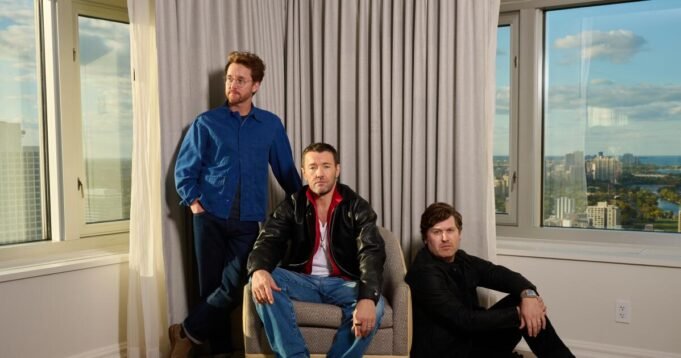From a quiet story about a logger, they knew they could build an American epic
“Train Dreams” is a film about America, a sumptuous from-the-ground-up vision of progress in the early to mid-20th century. It’s about railroads and bridges carved into untamed expanses of the Pacific Northwest, as well as the sacrifices and growing pains necessary to move the country toward modernity.Yet “Train Dreams” is more specifically about one tiny dot in the pointillist painting of the country: a humble laborer, Robert Grainier (a soulful, understated Joel Edgerton), who does seasonal work for logging companies when he’s not at the idyll he’s built for his family in the Idaho woods. Men like Grainier contributed to these immense feats of infrastructure, but only rarely caught a glimpse of their own handiwork. He literally cannot see the forest for the trees.Sitting with the film’s director Clint Bentley, co-writer Greg Kwedar and Edgerton at a conference table on the 33rd floor of the Four Seasons in Chicago, it’s hard not to imagine what Robert would make of the view from the windows, with their full panorama of the city’s west and south sides leading out to Lake Michigan.“There are a lot of great films I love that when you watch, it feels like when you’re looking at the night sky and you just see the full dust of the galaxy,” says Kwedar, 41. “But I think our work sometimes feels like taking a telescope, pointing it at the crater of a moon and feeling the same sensation of wonder and excitement. There’s a power to drawing close to someone and fully looking them in the eyes and letting that also convey a vastness.”Through Bentley and Kwedar’s telescope, “Train Dreams” feels like an epic in miniature, with an intimacy and scale that’s carried over from the succinct prose-poetry of Denis Johnson’s 2011 novella on which it’s based. In many ways, Robert is a stand-in for the many soft-spoken, working-class men who contributed their small part to a project much larger than themselves.Yet the movie also sinks deeply into the specific, personal mysteries of a man who’s whispered about as a “hermit,” but who pursues his own vision for how his life might be shaped. At least until fate plays a hand.Part of the appeal for Edgerton, an Australian actor whose bruised masculinity connects his performances in work like “Animal Kingdom,” “Loving” and the Disney+ series “Obi-Wan Kenobi,” is that audiences will see more of themselves in Robert than in the larger-than-life heroes of most Hollywood features. In a sea of Great Man narratives coming out of Hollywood, “Train Dreams” stands out for being more simply about A Man.“Lifting up an ordinary life onscreen is one way for audiences to really connect in a way that they don’t often get to do,” says Edgerton, 51, now shorn of the bushy beard that masks his age in the film. “The patience and stillness that Clint has built into the film allows people to then ruminate on their own life while going on Robert’s journey in a way that’s significant.” Joel Edgerton in the movie “Train Dreams.” (Netflix) For Bentley and Kwedar, who both write and direct, this type of minor-key storytelling has defined a unique collaboration they started when they met as aspiring filmmakers 15 years ago. Bentley, 40, recalls a time when the two were driving through Austin, Texas, together and talking about the kinds of movies they hoped to make one day. “I went on this long, rambly monologue about ‘these types of characters in this type of place and dah, dah, dah,’ and Greg’s like, ‘Human connection in impossible places.’”He laughs. “Greg is the king of the catchphrase.”Starting in 2016 with “Transpecos,” Kwedar’s acclaimed indie thriller about three border patrolmen drawn into a deadly conflict with a Mexican drug cartel, the two have established a unique partnership that’s carried them through four films and counting. (A fifth, “Saturn Return” with Rachel Brosnahan and Will Poulter, is currently shooting in Chicago, with Kwedar directing.) Unlike other filmmaking duos, where the credits don’t quite reflect a complex fusion of responsibilities behind the camera, Bentley and Kwedar write screenplays together for just one of them to direct, on an alternating basis. In the case of “Train Dreams,” that’s Bentley.Yet the films are still yoked together under Kwedar’s helpful catchphrase — human connection in impossible places — as well as their tendency to bring lesser-known character actors into the spotlight. Clifton Collins Jr., who starred in “Transpecos” and has a brief cameo in “Train Dreams,” won an acting award at Sundance for his title turn in Bentley’s heartbreaking 2021 film, “Jockey,” as an aging horse racer still clinging to the reins. And Colman Domingo picked up a lead actor nomination at last year’s Oscars for playing an inmate who leads a theater performance troupe in Kwedar’s “Sing Sing.” (Bentley and Kwedar were also nominated, along with Clarence Maclin and John “Divine G” Whitfield, for their adapted screenplay.) “Lifting up an ordinary life onscreen is one way for audiences to really connect in a way that they don’t often get to do,” says Edgerton. (Bryan Dockett / For The Times) Though Bentley and Kwedar didn’t write “Train Dreams” with Edgerton in mind, the universe seemed to be pushing the three together. Edgerton read the novella at a friend’s suggestion and was so moved by it that he inquired about the rights himself, perhaps as a follow-up to “Boy Erased,” the Russell Crowe–Nicole Kidman drama that he co-starred in and directed in 2018.“It resonated with me on a really deep level and so I had made a very simple inquiry about the rights to it,” says Edgerton, already worried that his connection to the material might not be easy to capture onscreen. “Part of me was relieved when the rights were taken.” Years later, the project would come back around to him after “Jockey” persuaded producers they had found their filmmaking team.Some books read like hardcover screenplays, so easily translated to the movies that publishing them first as a novel almost seems like an unnecessary formality. “Train Dreams,” on the other hand, is great literature — which is, to say, a hassle. Johnson describes Robert’s life in evocative bits and pieces, often disconnected from time, and the relationships and encounters he has are written more like memories than melodrama.Kwedar confesses to being “a pretty linear storyteller and filmmaker” and says he initially felt ill-suited to the task. “I was very intimidated by just the quality of the prose,” he recalls. “Johnson is able to convey the largeness of human experience through the tiniest, punchiest sentences.”Rather than losing those sentences entirely, Bentley and Kwedar tucked them into judicious passages of voice-over narration by Will Patton, who had also recorded the audiobook. But the larger problem for Bentley was trying to get inside the head of a logger who’s the very definition of “still waters run deep.” Books can do that easily. Films are another story.“It was really important to have Robert be this character who doesn’t say much,” says Bentley. “We have this character who has very big emotions and very deep thoughts and a real curiosity about the world, but he doesn’t have the vocabulary to express that.” “There’s a place for all kinds of art,” says co-writer Greg Kwedar, left, pictured with “Train Dreams” director Clint Bentley. “But I think Clint and I are drawn to stories that have an optimism to them, even within the hardships that our characters often face.” (Bryan Dockett / For The Times) Though Robert may be classified as a hermit, his story still unfolds in phases where he develops meaningful connections. Foremost there’s the love of his life, Gladys (Felicity Jones), who follows him to a blissful future in a forest clearing where they build a cabin and start a family together. There’s the stray red dog who’s a steady companion when he’s out living in a lean-to during the summer working months. And then there’s Claire (Kerry Condon), a national forestry worker who takes an interest in this peculiar and taciturn stranger. It’s heartrending stuff on the page, but getting it onscreen was a challenge.That’s where an actor like Edgerton comes in. Bentley calls him timeless, in the mode of old-school greats like Steve McQueen, Paul Newman or Lee Marvin, someone who “can do so much with so little.”“I’ve got four emotions,” jokes Edgerton. “Happy, angry, sad, confused.”Doing so much with so little comes naturally to Edgerton, who grew up in Australia alongside his brother Nash, an actor, director and stuntman. “I think it’s like a lot of the men in my life,” he says. “The last thing that they would be caught dead doing is showing deep emotion in front of other people. Clint and I spoke a lot about the valve of emotional expression and how that’s experienced by an actor versus how it’s received by an audience.”As modestly as he can, Edgerton likens his performance to the work of Anthony Hopkins in the ’90s such as “The Remains of the Day,” in which he played an English butler whose affection for the housekeeper (Emma Thompson) is as buttoned-up as the vest on his three-piece suit. “You see his stoic characters walk into a separate room on their own in order to finally let a little bit of emotion out,” he says. “It broke me. There’s a certain feeling I have about how much men (like Robert) are willing to show.” Joel Edgerton and Felicity Jones in the movie “Train Dreams.” (Adolpho Veloso / Netflix) Though the timeline for “Train Dreams” is limited mainly to the first half of the 20th century leading into the 1960s, there are contemporary resonances to the film that are hard to miss. In an early sequence lifted straight from Johnson’s novella, Robert’s partner on an enormous two-man saw — one of the many Chinese laborers who helped forge a pathway to the west — is dragged off the job by a violent mob. The man’s terrible fate haunts Robert for the rest of his life, reflecting a country where immigrants are often targeted by nativist fury.“I think it says so much about the goodness of Robert, the purity of him, that no outside person would judge him as being culpable in the death of that worker, but he’s haunted by his involvement,” says Edgerton. “At the same time, this is not just America. Australia is the same. I’m living in London and it’s the same there too. It’s a complicated world where immigrants bolster a country’s workforce with foreign workers yet casts them aside and mistreats them.”For Kwedar, Robert’s dilemma in that scene mirrors the experience of many ordinary people.“What measure of complicity do we have in things that feel beyond our control?” the screenwriter offers. “Where is our room to influence what feels like going against a swelling tide? Where could we have intervened? How could we have stopped something?”Yet for as much as “Train Dreams” speaks to present-day ills — the filmmakers had to steer clear of a real wildfire while staging one of their own — Bentley and Kwedar are not pessimists by nature and their films could never be described as despairing, especially when it comes to human beings. Robert experiences setbacks and tragedy, but his individual story is folded into a vision of America where his invisible life has meaning.Resilience is a theme that runs Bentley and Kwedar’s work, so they’re experts at creating crucibles that test their characters’ wills, like a jockey eking more miles from his broken body or inmates seeking peace and transcendence in a notorious correctional facility. Kwedar feels the world is “certainly growing more dangerous in some ways, but is also just more cynical.”“There’s a place for all kinds of art,” says Kwedar. “But I think Clint and I are drawn to stories that have an optimism to them, even within the hardships that our characters often face. We find people who can choose to believe in each other again and can choose compassion and kindness in an inhospitable world.”As our conversation winds down, there’s one last important topic to discuss: Could Edgerton hold a job as a logger in early 20th century Idaho? How good are his chopping skills?“Pretty good,” the actor says with a modest smile. “Pretty good.”“What’s your favorite-looking tool?” asks Kwedar.“Axe. The double-headed axe, yeah.”“Not the crosscut, right?”“I don’t like the crosscut, because you’re relying on someone else.”All of which brings us back to the scene with the Chinese laborer, and the symbolism of losing the person on the other end of the saw, rendering it useless. Edgerton recalls a moment cut from the film, in which the boss orders all the other workers to settle back into their menial tasks.“Life continues on,” he says. “The world swallows things up and now everyone’s got to get back to work.”In “Train Dreams,” American progress comes at a cost, one that’s sometimes paid unjustly or off the backs of laborers like Robert Grainier. They may not see the wonders they create, but through Bentley and Kwedar’s lens, their rail lines and train trestles stand like monuments against the sun-kissed backdrop. The film is big enough to see the country they had a hand in building and small enough to locate their fingerprints.
Δημοσιεύτηκε: 2025-11-05 19:00:00
πηγή: www.latimes.com









